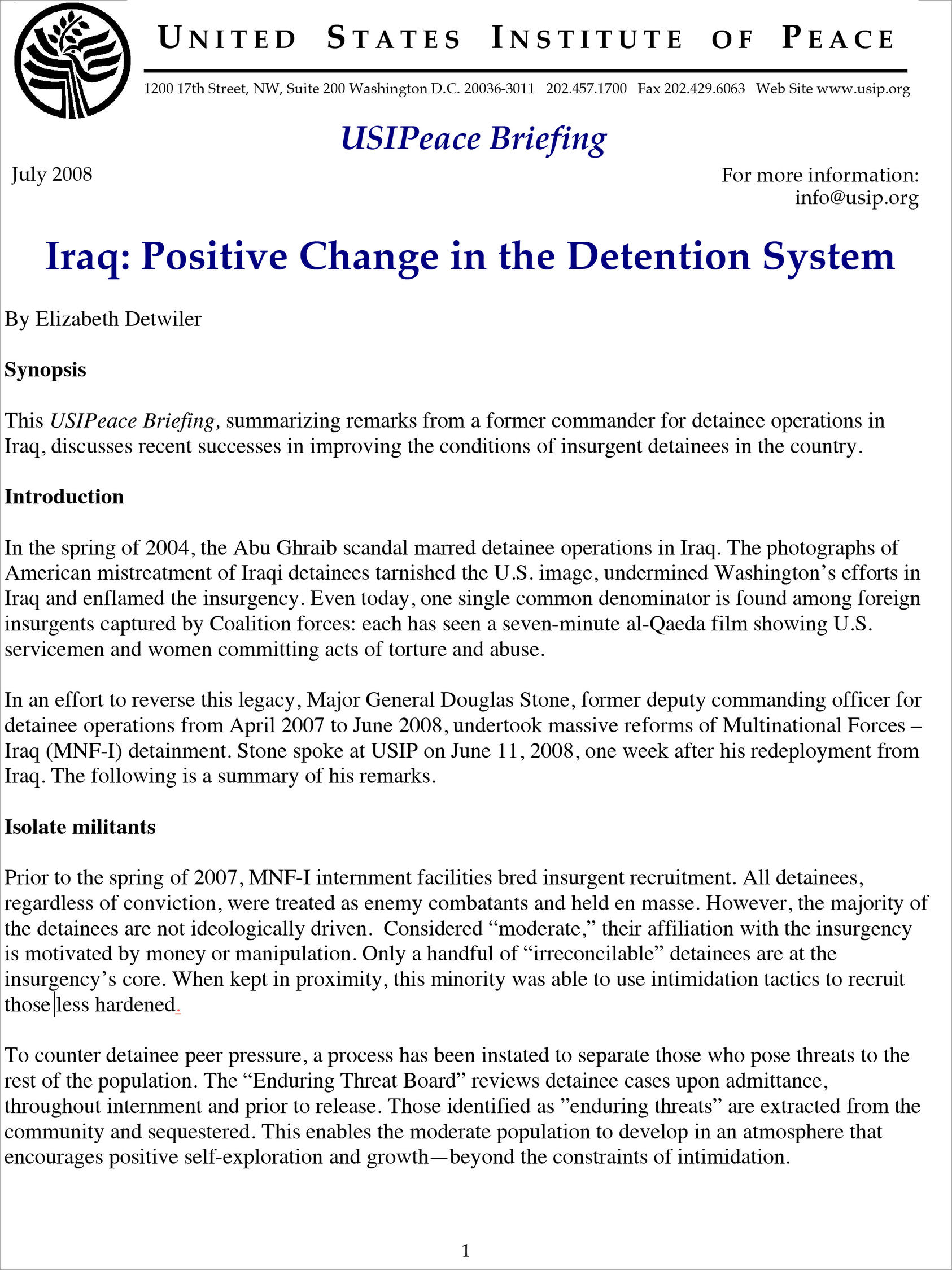This USIPeace Briefing, summarizing remarks from a former commander for detainee operations in Iraq, discusses recent successes in improving the conditions of insurgent detainees in the country.

Synopsis
This USIPeace Briefing, summarizing remarks from a former commander for detainee operations in Iraq, discusses recent successes in improving the conditions of insurgent detainees in the country.
Introduction
In the spring of 2004, the Abu Ghraib scandal marred detainee operations in Iraq. The photographs of American mistreatment of Iraqi detainees tarnished the U.S. image, undermined Washington’s efforts in Iraq and enflamed the insurgency. Even today, one single common denominator is found among foreign insurgents captured by Coalition forces: each has seen a seven-minute al-Qaeda film showing U.S. servicemen and women committing acts of torture and abuse.
In an effort to reverse this legacy, Major General Douglas Stone, former deputy commanding officer for detainee operations from April 2007 to June 2008, undertook massive reforms of Multinational Forces — Iraq (MNF-I) detainment. Stone spoke at USIP on June 11, 2008, one week after his redeployment from Iraq. The following is a summary of his remarks.
Isolate militants
Prior to the spring of 2007, MNF-I internment facilities bred insurgent recruitment. All detainees, regardless of conviction, were treated as enemy combatants and held en masse. However, the majority of the detainees are not ideologically driven. Considered “moderate,” their affiliation with the insurgency is motivated by money or manipulation. Only a handful of “irreconcilable” detainees are at the insurgency’s core. When kept in proximity, this minority was able to use intimidation tactics to recruit those less hardened.
 Iraqi men wait for the official ceremony of their release in Mahmoudiya, site of a recent major USIP effort in Iraq, May, 2008. American forces released 101 detainees who returned home to the Mahmoudiya area. (AP Photo/Loay Hameed)
Iraqi men wait for the official ceremony of their release in Mahmoudiya, site of a recent major USIP effort in Iraq, May, 2008. American forces released 101 detainees who returned home to the Mahmoudiya area. (AP Photo/Loay Hameed)To counter detainee peer pressure, a process has been instated to separate those who pose threats to the rest of the population. The “Enduring Threat Board” reviews detainee cases upon admittance, throughout internment and prior to release. Those identified as ”enduring threats” are extracted from the community and sequestered. This enables the moderate population to develop in an atmosphere that encourages positive self-exploration and growth—beyond the constraints of intimidation.
Educate, train and connect families to detainees
MNF-I interment facilities have introduced official career programs and religious and social seminars to replace the insurgents’ radicalization agenda. MNF-I has also introduced more than 100 voluntary programs for detainees. Of particular interest is the civics course; lessons on civic behavior are extracted from Islamic texts and discussed in a guided dialogue. Detainees explore their religion with the help of Iraqi counselors and Imams.
Most importantly, detainees learn how to read. Sixty-eight percent of detainees are illiterate, making them prime targets for insurgency recruitment. Unable to independently interpret religious texts, illiterate detainees are subject to manipulation by the insurgency elite who twist Islamic teachings to serve their ends. Current literacy programs empower detainees to interpret Islam for themselves—a blow to insurgency recruitment efforts.
MNF-I detainment facilities have developed policies of openness and transparency designed to alleviate Iraqi fears and defuse myths of mistreatment in the broader community. A family advocacy program has been introduced to facilitate family visitations to detainees. A similar policy has been extended to the media. Interviews by recently released detainees have presented a more positive image of MNF-I treatment of detainees in broadcasts throughout the Arab world.
Release those who are not security risks
Holding on to moderate detainees wastes resources and feeds Iraqi resentment. Swift and responsible action should ensure the release of “as many, as quick as you can, who are no longer an imperative security risk.” During the initial months of the surge, detainee numbers rose from around 18,000 in May 2007 to 23,000 in August 2007. At that time they were projected to rise to 50,000 by December 2008. Under General Stone, this number leveled to 21,000 and is still declining. Detainees now receive stipends for up to six months after their release in order to discourage regression. In addition, plans are underway for an employment program for former detainees.
Most observers, both Iraqi and MNF-I, agree that, ideally, Iraqi courts should adjudicate detainee cases. However, persistent complications preclude this transition. The security situation is still too unstable. Employees of the Iraqi judicial system are under constant threat, limiting the capacity to make civilian arrests and hold conventional trials. Moreover, this system simply cannot absorb even a fraction of detainee cases currently held by MNF-I.
Positive impact to date
In May 2007, MNF-I theater internment facilities were overcrowded and rife with insurgent activity. Rioting and detainee-on-detainee violence was a daily routine. Today, such rage is nearly imperceptible. The recent improvement can be attributed to the new leadership’s ability to correctly assess the situation and adapt: disaggregate and empower the detainee population, encourage swift releases and institute a policy of openness.
This USIPeace Briefing was written by Elizabeth Detwiler, program assistant in the Center for Post-Conflict Peace and Stability Operations at the United States Institute of Peace. The views expressed here are not necessarily those of USIP, which does not advocate specific policies.
The United States Institute of Peace is an independent, nonpartisan institution established and funded by Congress. Its goals are to help prevent and resolve violent international conflicts, promote post-conflict stability and development, and increase conflict management capacity, tools, and intellectual capital worldwide. The Institute does this by empowering others with knowledge, skills, and resources, as well as by directly engaging in peacebuilding efforts around the globe.
